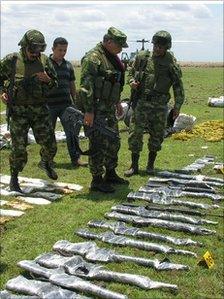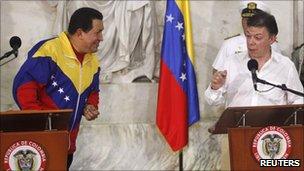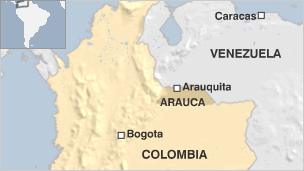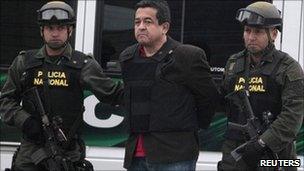Colombia border province sees rebel attacks increase
- Published

Arauca is now considered one of the most dangerous areas of Colombia
The River Arauca forms the border between Venezuela and this region of Colombia.
Left-wing rebels have long hidden on the other side, beyond the reach of the Colombian security forces.
But now the situation in Venezuela appears to be changing and the guerrillas are coming back.
The result, according to local officials, is a rise in violence.
"We have received information from intelligence sources that 200 guerrillas have returned from Venezuela to Arauca and are responsible for the increased attacks so far this year," said Clara Merchan, who works with the mayor's office on security issues in Arauquita.
Less than a year ago, tensions were running high between Colombia and Venezuela.
Diplomatic relations had been severed after President Alvaro Uribe brought a complaint against Venezuela, in June 2010, before the Organization of American States (OAS).
The Colombian government insisted that there were 1,500 rebels in Venezuela, many living in large camps, unmolested by the Venezuelan security forces.
Colombia accused President Hugo Chavez of supporting the rebels of the Revolutionary Armed Forces of Colombia (Farc) and the National Liberation Army (ELN) in their 47-year campaign to overthrow the state.
Lying low
Today, relations could not be more different.
One of the first acts of Colombian President Juan Manuel Santos, when he took office last August, was to make up with Mr Chavez.

The improvement in ties has seen big changes on the ground - in both countries
Since then it has been all smiles and back slaps, with President Chavez referring to his Colombian counterpart as his "new best friend."
Venezuela has since extradited almost a dozen rebels to Colombia and established frontier security commissions. Trade is again a priority.
This has forced the Colombian rebels to adopt a far lower profile in Venezuela, where they have dismantled their bigger camps.
They do, however, still use Venezuelan territory to export drugs and import weapons, munitions and explosives.
In March, the Colombian army intercepted a truck which was apparently bringing rebel supplies from Venezuela.
According to the military, the vehicle was carrying 1.5 tonnes of explosives, 5,000m (16,000ft) of detonation cord, 17 rifles, 42,000 bullets and almost 200 uniforms, all bound for the estimated 500 Farc rebels in Arauca.
There was so much explosive material that the army decided to destroy the truck where it stood, leaving nothing but a huge crater and the odd piece of metal.

The return of the rebels from Venezuela has meant more attacks, especially on infrastructure.
The Farc have blown up oil and gas pipelines along the border, attacked railways, and in Arauca there have been constant attacks on the security forces, making the province one of the most dangerous in the country.
Checkpoints
The inhabitants of this sun-baked plain are used to living alongside the rebels - and the army.
Many know rebels personally and can identify the families in the rural areas which have traditionally fed guerrilla ranks.
The security forces are also a part of daily life.
In the town of Saravena, there is a tank parked outside the police station. The province's main road has innumerable checkpoints as the army searches for rebels, weapons and explosives.

The extradition of suspected guerrillas is one visible sign of changed bilateral relations
Locals pull up at checkpoints, automatically getting out of their cars and putting their hands on the bonnets, ready to be frisked by soldiers.
Despite the rise in violence locally, officials have welcomed the fact that Venezuela is taking action against the rebels.
There was surprise and no small amount of satisfaction when Venezuelan authorities captured two ELN guerrillas in March. They had fled across the border having just killed three Colombian marines in an ambush in Arauca.
"There is still much to do, but our relations with the Venezuelan police are improving and there is real co-operation," said Col William Guevara, the chief of police in Arauca.
These latest developments contrast with thousands of rebel e-mails and documents studied by the London-based International Institute for Strategic Studies.
The files were held on computer hard drives and memory sticks belonging to a top rebel leader, Raul Reyes, killed during an aerial bombardment by Colombian troops in March 2008.
The IISS report, published in May, , external said that the files indicated that Mr Chavez had offered money to the Farc and let the rebels base themselves in Venezuelan territory.
Venezuela has denied all these accusations, insisting they are attempts by international intelligence agencies to discredit Mr Chavez.
The Venezuelan government has also challenged the assertion that the files were not tampered with by the Colombian authorities.
Whatever the truth, the rebels are not receiving a warm welcome in Venezuela at the moment.
- Published29 August 2013
- Published10 May 2011
- Published27 April 2011